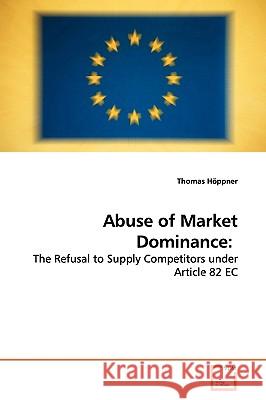Abuse of Market Dominance » książka
Abuse of Market Dominance
ISBN-13: 9783639141412 / Angielski / Miękka / 2009 / 128 str.
This reprint of an LL.M thesis completed in year 2004 analyses the EC competition law rules on the duty to supply competitors, and in particular the impact of the modern essential facilities doctrine on traditional case law. In an attempt to establish a consistent analytical framework in respect to the question of when and under what conditions a competitor must be supplied, this study suggests that in the future, a clearer distinction should be drawn between cases concerning access to essential facilities and cases involving other factors such as an unwarranted monopoly extension, discrimination or the penalisation of vigorous competition. By examining the repercussions of IMS Health and Microsoft, the study suggests that the relevance of the interventionist essential facilities doctrine is limited to rare cases, including access to unused infrastructures, de facto standards, certain platform technologies or software interfaces."
This reprint of an LL.M thesis completed in year 2004 analyses the EC competition law rules on the duty to supply competitors, and in particular the impact of the modern ´essential facilities` doctrine on traditional case law. In an attempt to establish a consistent analytical framework in respect to the question of when and under what conditions a competitor must be supplied, this study suggests that in the future, a clearer distinction should be drawn between cases concerning access to ´essential facilities` and cases involving other factors such as an unwarranted monopoly extension, discrimination or the penalisation of vigorous competition. By examining the repercussions of IMS Health and Microsoft, the study suggests that the relevance of the interventionist ´essential facilities` doctrine is limited to rare cases, including access to unused infrastructures, de facto standards, certain platform technologies or software interfaces.











